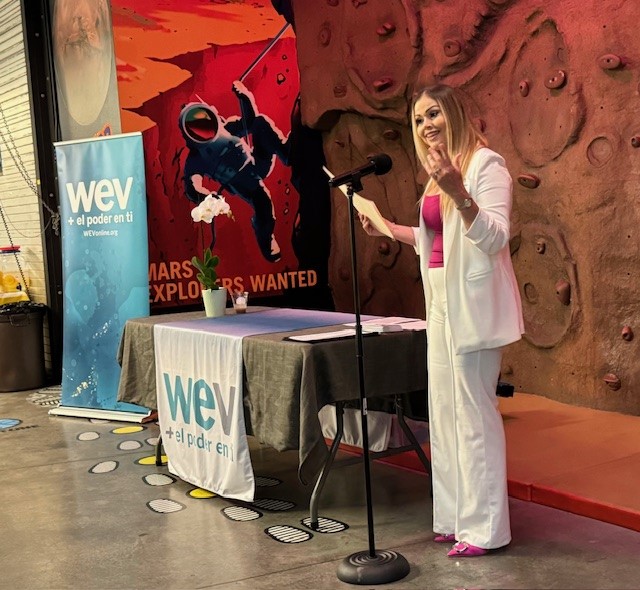- Business Resources
-
-
More Resources
-
Have Questions?
-
- Financial Empowerment
-
-
more resources
-
have questions?
-
- Support WEV
- About WEV
-
-
More About WEV
Meet WEV’s Team
-
Have Questions?
-
- Topmenu
-
April is Earth Month, culminating in Earth Day on April 22nd. First held in 1970 across the nation (including Santa Barbara), Earth Day is now a globally-recognized celebration in which millions of people from more than 190 countries worldwide come together to advocate for a more equitable and climate resilient future.
In today’s world, where climate change is a defining issue, small businesses can play a critical role in building a resilient future. The business community, and especially our small businesses, are proven incubators of innovative ideas and products that can improve lives and protect the environment.
Why is prioritizing climate resilience important for small business?
According to the World Economic Forum, extreme weather events, failure of climate change adaptation, and natural catastrophes were ranked in the top 10 risks for business leaders in North America in their Regional Risks Report. By building resilience, businesses can adapt to changes, anticipate future challenges, and better withstand shocks.
Small businesses make up 90% of all businesses globally. While individually they may not be major emitters, the size of this business segment means that they can play a significant role in global efforts to mitigate climate change and advance environmental justice. Through collective efforts, small businesses can drive meaningful change and inspire larger corporations and governments to follow suit.
What does it mean to be a green business?
Green businesses are businesses that follow practices that reduce their environmental impact and protect their employees. This can include:
- Reduced water use
- Energy conservation
- Sustainable commutes
- Pollution prevention
- Use of non-toxic cleaners
- Waste diversion
- Recycling materials
- Purchasing from local vendors
In 2022, green businesses in California alone reduced greenhouse gas emissions equivalent to planting over 148,000 acres of trees.
The business case for going green
The benefits of going green extend far beyond environmental impact. Embracing sustainability can lead to cost savings through energy efficiency and waste reduction, improve brand reputation and customer loyalty, and enhance employee morale and productivity. According to a report by U.S. Small Business Administration, green businesses can save up to 30% on energy costs and reduce waste disposal expenses by up to 90%. These savings can significantly improve the bottom line for small businesses, allowing them to invest in growth and innovation.
Going green can also open new market opportunities, as consumers are increasingly seeking out eco-conscious brands. A global report from The Economist Intelligence Unit commissioned by WWF found that there was a 71% rise in online searches for sustainable goods globally over the past five years.
Implementing green business practices can help future-proof operations, keeping businesses ahead of regulatory requirements and potentially attracting investors looking for socially responsible ventures. Overall, the decision to become a green business is not only a responsible choice for the planet but also a strategic one for long-term business success.
Local green business spotlight: EcoStiks
Julie Schneiderman, a WEV client and Crafting a Value Proposition course presenter, became a California Certified Green Business in 2023 and is a 1% for the Planet member. Julie is the founder of EcoStiks, a local business that creates custom fabric stickers made from recycled water bottles for promoting, branding, and retail.

Julie’s entrepreneurial journey and journey into green business evolved together. Her business idea stemmed from her love of the ocean and a desire to create a business that prioritizes protecting ocean ecosystems. As her product launched and evolved, she highlighted the environmentally friendly business aspects of EcoStiks, which became a key component of her value proposition statement.
Ecostiks’ goal is to bring community awareness to single-use plastics and environmental issues. Schneiderman shared that the product and business model transformed to become a platform for change. Ecostiks is a platform for expression that creates an entry point for organizations to invest in a business that is returning a percentage of the profits to support environmental initiatives. Today, they are continually looking for ways to make their production process more circular, launching an ambassador program to highlight stories of community leaders doing impactful environmental work, and expanding to pitch to larger companies.

When asked what her advice would be for business owners looking to become more climate friendly, Schneiderman said, “Start slowly by just implementing one thing at a time and then scale over time. Reach out to other business owners and ask what changes they have made. In the long run, going green builds legitimacy and branding for your own business.” Schneiderman recommends setting one small, achievable goal at a time to gradually integrate sustainability into business. Any effort, big or small, makes a difference.
Taking the next steps: Becoming green certified in Santa Barbara and Ventura Counties
The Green Business Program offers resources and support for businesses in Santa Barbara and Ventura counties looking to make the transition, making it easier than ever for businesses to take climate action. These resources are available for English and Spanish speakers. Getting certified involves several steps, including:
- Register and apply through greenbusinessca.org – Select the business ownership status. Businesses are eligible to apply whether you own the building, rent, or work in a home office.
- Review Criteria – Watch or attend a Green Business Academy to learn about the checklists and how to meet program requirements.
- Program Fee (Santa Barbara County only) – Before beginning the certification process, the business will need to pay a fee based on its sector and size.
- Assessment – After submitting your application, Green Business Program staff and partners will visit the business to provide hands-on assessment and technical assistance in implementing the required measures.
- Final evaluation and certification – Once certified as a Green Business, businesses receive a printed certificate and other promotional materials.
Transitioning to green business practices is a win-win. Not only does it benefit the environment and the community, but it can also benefit your business by attracting customers, reducing costs, and enhancing your reputation as a socially responsible business. If you are interested in learning more, check out the resources below.
Green Business Resource Guide
The California Green Business Network leads the state and nation in working with small to medium sized businesses to create a vibrant green economy. Learn more and apply to become a green certified business.
- For Ventura County Business Owners visit: Green Business Programs (greenbusinessca.org)
- For Santa Barbara Business Owners visit: Green Business Programs (greenbusinessca.org)
Santa Barbara County is committed to preserving the economy and environment. Businesses can make small changes that can have a big impact. This webpage includes links to resources with tips and information related to available incentives, certifications and other valuable organizations and resources that can help make greening buildings and businesses easier. Learn more at: Incentive, Assistance & Certification Programs – County of Santa Barbara
Find incentive and rebate programs in California for making the transition to clean energy. Learn more at: Statewide Incentive Programs
Find national energy savings opportunities through tax credits and rebates when upgrading your home and vehicle. Learn more at: National Energy Savings
Discover projects, contractors, and exceptional financing options to enhance your home or business and contribute to a greener California. Learn more at: California Energy Efficiency Loans for Homes & Businesses | Go Green Financing
The Westside Community Development Corp is providing support for Spanish speaking business owners to get Green Business Certified. Learn more at: Business Resources – WCDC (westsideventura.org)


